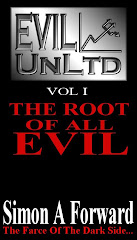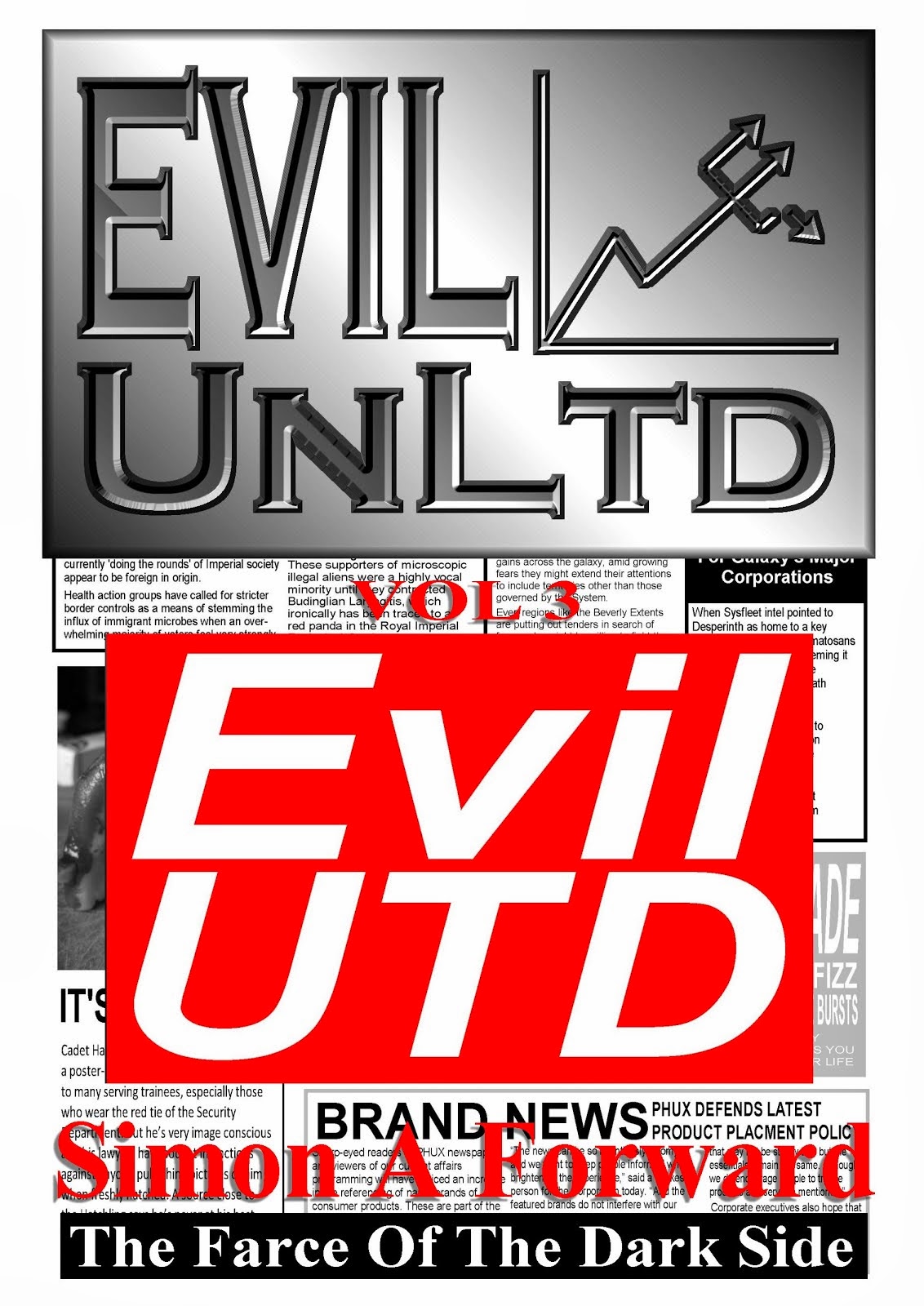Not only was he the editor, presiding over BBC Books' Doctor Who range 'back in my day' - and continues in his role as Creative Consultant for the range - if you want some idea of just how prolific he has been as an author, you need only check out this list on Amazon and prepare to be impressed. Even setting aside the mountain of Doctor Who books and audio dramas, he's written a host of other original series, collaborated - creatively! - with Jack Higgins, and has recently ventured into the Kindle arena with another creation of his own, The Skeleton Clock. So it's even more of an honour that he took time out of his scribely schedule to answer a few questions.

Now, for openers, I already have my copy of The Skeleton Clock on my Kindle, so technically you don't have to sell me on the book, but give us an elevator pitch for the novel. What does the story have going for it?
The main thing – I hope! – is that it’s a good, exciting story. It’s set in the City, which is London some time in the future when the sea level has risen and the Thames has flooded out across the city. The ground has fractured and moved, so there are areas that are completely under water, and others where just the tops of the buildings stick out of the flood. So it’s sort of recognisable, but very different – St Pauls Cathedral is just the dome above the water and called ‘Whispers’. If you look out from there you can see the twisted, broken remains of the Gherkin, with the glass shattered and the rusting skeleton of the structure just about intact and that’s The Twisting. But to get there you’d have to take a boat – maybe from Nelson’s Mooring, which is this statue on a short plinth sticking out of the water. Or maybe you can find a way through the old tunnel network under the city – though that can be dangerous as the tunnels are liable to flood without warning...
So it’s a fascinating environment, society breaking down and everything sort of skewed. Into that, let’s add a mysterious antique bookshop, and some nasty villains, some secret experiments, a talking statue and of course sea monsters!
Sorry – I think our elevator travelled through a lot of floors there, didn’t it?!
You are a prolific author with a host of published material to your credit. Why on earth would you choose to add to your workload by venturing into the independent publishing arena?
It’s an experiment and an adventure. I wasn’t really sure what to do with The Skeleton Clock once I’d written it, so I thought it would be a good novel to try as an eBook. Seeing the royalty rates publishers are offering, and watching some ‘independent’ novels doing so well as eBooks, I thought I’d better find out what it’s all about. I read almost everything on my iPad now, and while I don’t think eBooks will replace the physical printed editions the market is going to be huge. So I wanted to know what’s involved – the formatting, submitting, publishing... And I’m getting into pricing and promotion as well. That’s where it gets trickier as I want to be an author not a publicist or marketeer. But even in print-publishing the author these days has to be more involved in the non-writing side of things...
Has it been a successful experiment? Too soon to know – but I don’t think I’ve lost anything by trying and who knows, maybe Spielberg will find the book...
As an author, I'm a fan of having two or three different projects on the go at any given time - in case inspiration runs temporarily dry on one, I always have something else I can turn to. But with so many different series and individual titles to your name, how do you juggle the various projects?
Panic usually. Well, actually it’s a complex algorithm that combines: (a) what do I want to do today? (b) which deadline is the soonest and (c) what was I working on yesterday as that’s likely to be easiest to pick up on again.
I tend to have things at different stages. So I’ll have several projects that I’m working on proposals or outlines for, some that are coming back to haunt me in the form of rewrites or proof reading or whatever, and I’ll have one that I’m actually working on the main writing part of. So I don’t actually write several things at once. Well, not really.
Also of all the creations and series to your name, which would you consider your favourite and why? (Setting aside Doctor Who!)
Ooh, that’s tricky. In fact, impossible. I love them all as much I think. I’m very proud of my standalone novels like The Chaos Code and The Skeleton Clock. But as series go The Invisible Detective was a great breakthrough for me – and such fun to do. The I sort of moved on with the books about the Department of Unclassified Artefacts. That was never really devised as a series, but there are three of them now (The Death Collector, The Parliament of Blood, and The Chamber of Shadows) – all of which have been great fun and very exciting to write...
Then I’m also proud of the work I’ve done with Jack Higgins – which was such a privilege, working with a literary hero of mine. And for sheer enjoyment, my younger children’s spy series Agent Alfie made me laugh the whole way though – even though writing funny is very very difficult!
I remember a favourite quote, from Sol Stein, that you used to cite to me: "A writer is someone who can't not write." Obviously with contracts and commissions come deadlines and demands, but is that creative impulse still very much a part of what drives you or is making time to write purely a discipline and/or part of the job?
I’m glad you remember that – it’s a good and apt quote isn’t it? And it applies to me just as much now as ever, I think. ‘Driven’ sounds a bit pompous, but if I go for a few days without actually writing anything then I do get itchy fingers – I need a keyboard. I need to write... something.
Doctor Who formed a large part of your writing - and editorial! - career for a long while and that was clearly a labour of love. How much of that influences your writing outside of the Doctor Who universe?
I suspect it’s a huge influence. I write the sorts of things I would love to read – or see or hear. And my absolute favourite series in any format is Doctor Who. So whatever I write will be to an extent tinged with that, I think. I don’t mean I’m writing Doctor Who without the Doctor, but I love that style of story – which may be quite realistic in so many ways, but underlying it is a huge fantasy or SF or horror conceit. There is something – in the true sense of the word – extra-ordinary going on. Maybe it’s ghosts, or the supernatural, maybe it’s monsters, maybe it’s extrapolating science, or maybe it’s flooding London and filling it with sea monsters and animated toys...

Back to the Skeleton Clock. It's a great title, but where and how was the idea for that story born?
I started with the setting – which I think is probably unusual for me. Usually I have an idea for a plot or a character. The Chaos Code came from the character of Julius Venture, for example. The Parliament of Blood came from a new take on Victorian Vampires... The Skeleton Clock started to tick (as it were) when I was watching an Alan Titchmarsh series on the BBC about the making of Britain in geological terms. There was sequence where they took London back to Jurassic times, or whenever, and they used CGI to flood Trafalgar Square I think – showed the water rising to where it would have been. I watched that short sequence and first I thought it was a terrific image. Then I thought that it could happen again in the future – just like they showed. Then I started to wonder what sort of stories you could tell set in that environment.
Finally, what's your take on the age of the Kindle and ebooks? And are there plans for a paperback edition of the Skeleton Clock?
To take the second question first, I’m not sure. I don’t want to become a print-publisher. But I might well take The Skeleton Clock round and try to sell the print rights. We’ll see – for the moment it’s ticking over (ha-ha) as an eBook.
As for the future of publishing, well now you’re asking. I think eBooks will become hugely important. More than that is difficult to predict. There’s the whole democratisation of publishing as well – anyone can publish a book. So how do Publishers fit into that? Will they be gatekeepers in the sense that readers will look to see if a ‘real’ publisher is behind a book as a guarantee of quality? How will Publishers persuade authors that they can add value to their work? Because I’ve seen both sides, I know that a publisher brings editorial advice and judgement as well as marketing clout and ‘branding’. But will that continue to be important?
There was a point, I remember as I was in the computer industry, when it was obvious that the whole video-game revolution would be driven by the film studios. They had the visual authors, they had the technology and expertise to produce what would be basically interactive films the user could control somehow. But it didn’t happen. The film industry stepped away from that – or rather, never realised it was there. A whole new industry grew up instead and for a while we talked about how the film industry would die as a result. We’re at a similar turning point now – or soon will be. Print books will survive, no question. But for the new, exploding eBook industry – will the existing publishers step up and bring their expertise to that, will they reinvent themselves and learn how to add value and stay in the game? Or will a new industry develop – like the teenagers and young entrepreneurs who jumped into the video-game vacuum? So far, eBooks are just print books put online. Will that continue to be the case, or will the eBook branch off and mutate into something very different?
We live – and write – in exciting times!
You can find The Skeleton Clock for your Kindle on Amazon or for other e-readers on Smashwords.
Further information on The Skeleton Clock, including a free sample, can be found on Justin's site along with details of many of Justin's other works.
SAF













